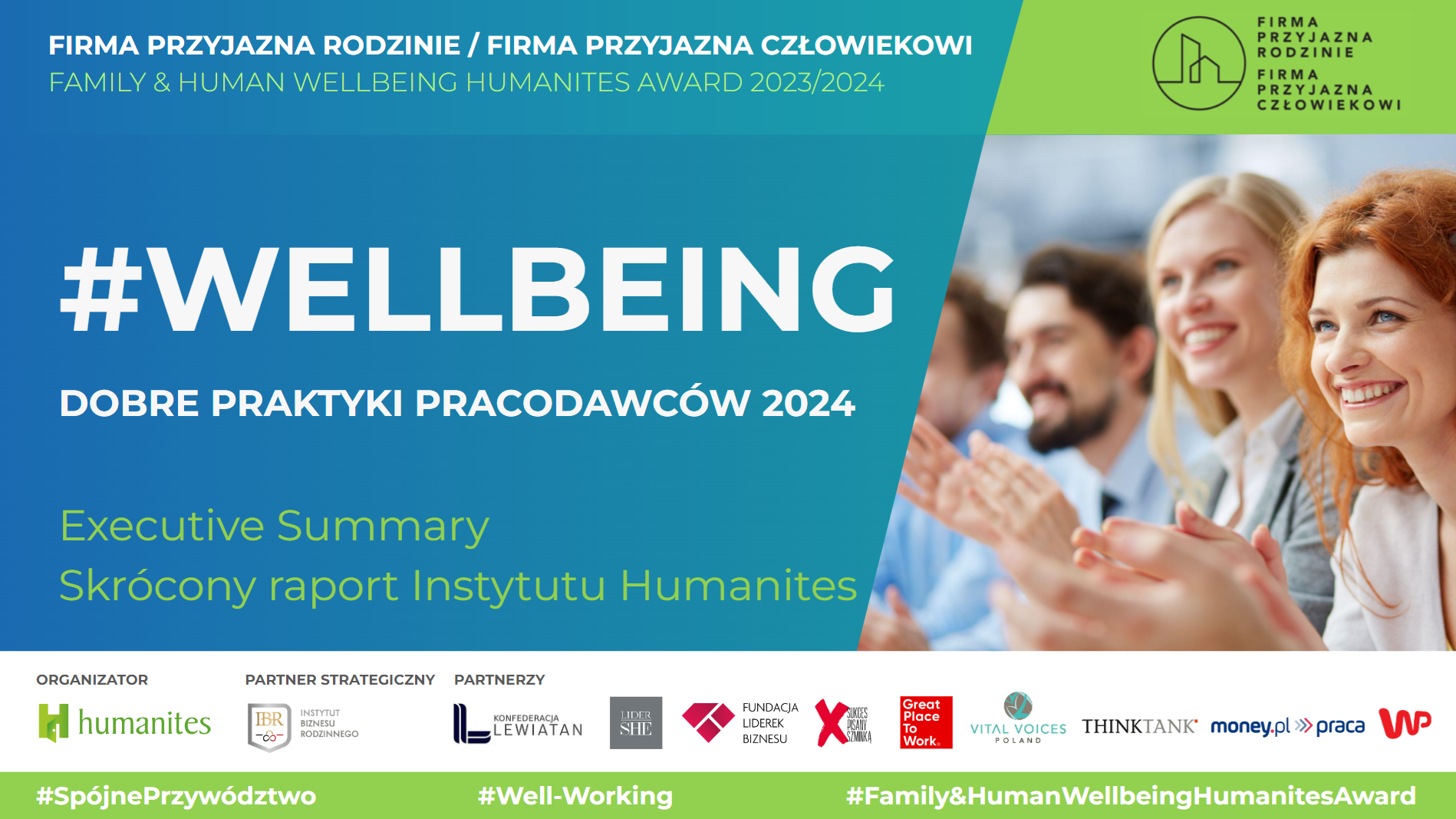Employer Best Practices Report 2024

Does working for small companies give you more of a sense of purpose? – Humanites Institute’s latest report: #Wellbeing. Employer Best Practices 2024 which reveals surprising differences!
Gender and job satisfaction. Men are more likely than women, and managers are more likely than rank-and-file employees to feel job satisfaction.
Small companies leading the way! In small companies, as many as 68% of employees feel they have a sense of influence, and as many as 65% of them would gladly recommend their workplace to others. Meanwhile, these numbers are drastically lower in large companies (in medium-sized companies the percentage is 41%, and in large companies it is 34%). There is an even higher disparity in favor of small companies when it comes to the sense of meaning found at work.
DOWNLOAD REPORT:
- EXECUTIVE SUMMARY
- Stay up to date with #wellbienig trends: BUY THE FULL REPORT
Cost of the report = a brick for Humanites activities
GET INVOLVED:
- How is the trend of a shortened workweek developing?
- What did Poles value most in the last year?
- Do companies invest in employees?
- Do employees have enough time and energy for their private lives?
The report #Wellbeing. Employers’ Best Practices 2024 was based on responses from more than a thousand employees from companies with a total of more than 19,000 employees. The survey covered a broad spectrum of issues, such as the integration of professional and private roles, a sense of identification with the company and multidimensional development. Respondents represented a variety of industries, including law, pharmaceuticals, finance and IT.
The survey took place on the occasion of the fourth edition of the Family Friendly Company/Human Friendly Company competition organized annually by the Humanites Institute. In it, companies are evaluated in terms of their strategic approach to human capital, the consistency of their welfare policies, and their holistic view of people and work culture.
The survey shows that those in managerial positions are more likely to report a higher sense of job satisfaction – 59 percent of them definitely feel satisfied with their work, compared to 40 percent of the rest of the workforce. The difference in responses can also be seen by gender: 50 percent of men rate their job satisfaction highly, while among women the figure is 42 percent.
There is also a clear convergence between the size of the company and the declared sense of influence. Among employees of small companies, as many as 68 percent rate it as definitely high. In contrast, in medium-sized companies the percentage is 41 percent, and in large companies it is 34 percent. The results are similar when it comes to the sense of meaning found at work. Employees of companies with fewer than 250 employees are also much more likely than the rest (65 vs. 50 percent) to recommend employment with their employer to others.
Those surveyed most value flexible work arrangements, opportunities for development, the ability to reconcile work and private life, as well as the atmosphere in the office and job security. At the same time, only 33 percent of men and 28 percent of women say that after work they have enough time and strength for family life and personal development. The percentage is even lower for those caring for seniors – 26 percent.
The report also shows that retraining programs are offered by only 1/3 of the companies surveyed. A significant difference in this regard can be seen between employees of small (up to 50 employees) and larger companies. The former were much more likely to perceive an explicit retraining opportunity (45 vs. 28 percent).
– The struggle for talent in the labor market continues, explains Zofia Dzik, president of the Humanites Institute. – Currently, already 66 percent of employers are having trouble filling vacancies. Paradoxically, however, although companies want to take part in the technological race and are suffering from staff shortages, at the same time they are not flocking to invest in reskilling programs. They would most like to hire already qualified employees, but this approach is untenable in the current situation. Therefore, companies wishing to have a specialized workforce should, on the one hand, recognize the potential of their employees and invest in good programs that enable existing employees to gain new skills, and at the same time take care of their retention by providing them with a wider range of benefits directed at improving their well-being. We have been diagnosing these transformations for several years as part of projects conducted at the Humanites Institute.
Competition Website: https://2godzinydlarodziny.pl/konkurs-firma-przyjazna-rodzinie-firma-przyjazna-czlowiekowi
Contact:
Katarzyna Lorenz
Director of communications and PR of the Humanites Institute
phone: +48 505 017 957
e-mail: katarzyna.lorenz@humanites.pl
Competition Partners
The strategic partner of the Competition is Instytut Biznesu Rodzinnego.
Supporting partners are: Fundacja Liderek Biznesu, Great Place to Work® Polska, Konfederacja Lewiatan, Stowarzyszenie LiderShe, Fundacja Sukcesu Pisanego Szminką, THINKTANK – Centre for Dialogue and Analysis, Vital Voices Chapter Poland, Money.pl